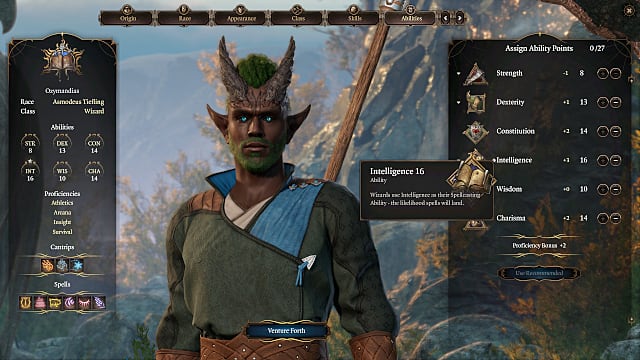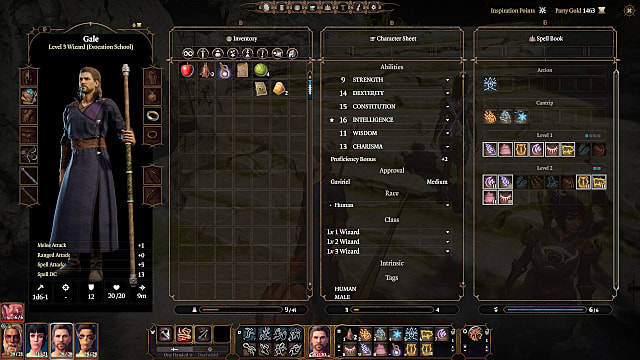Regardless of which Wizard you’d like to build, everything you need to know about building the perfect Baldur’s Gate 3 Wizard is covered below!
Baldur’s Gate 3 Best Wizard Build
Character builds in Baldur’s Gate 3 boil down to a selection of:
Race/Subrace Class/Subclass Origin Skills Abilities Feats
As a Wizard, this also includes Cantrips and Spells.
Don’t fret about creating the most effective Wizard in Baldur’s Gate 3, however.
As in all of my other Baldur’s Gate 3 build guides, you’re encouraged to build the character you’d most like to roleplay in BG3. If you follow this guide as a loose framework, you will find it much easier to design the best Baldur’s Gate 3 Wizard for you.
Baldur’s Gate 3 Wizard Starting Class Features
6 Hit Points + Constitution modifier 3 Wizard Cantrips 6 Wizard Spells 4 Prepared Wizard Spells Wizard Spell Slots Intelligence Saving Throw Proficiency Wisdom Saving Throw Proficiency Dagger Proficiency Dart Proficiency Sling Proficiency Quarterstaff Proficiency Light Crossbow Proficiency Arcane Recovery (Action)
Best Wizard Races
Though there are eight “base” races in Baldur’s Gate 3, there are actually 16 subraces. Your race is important because what you choose permanently impacts your character’s stats. Certain races come abilities like Darkvision and built-in Skill Proficiencies.
One of the coolest features of BG3 is that there’s often a roleplaying implication to your choice of race, which can change outcomes of various quests and dialogues throughout Faerûn. Your Dwarf Wizard, for example, will not be treated the same by the world and its inhabitants as your Githyanki Wizard.
The Wizard’s primary stat is Intelligence, but its Saving Throws are based on Intelligence and Wisdom. As is explained below, your BG3 Wizard’s primary stat needs should at least inform your choice of race.
However, as I’ll say several times throughout this guide, feel free to create any race/class configuration if it seems interesting to you.
Intelligence influences the Wizard’s ability to cast Spells. It also influences their Saving Throw and their aptitude at Intelligence-based skill checks.
The following races offer the greatest starting bonus to Intelligence:
High Elf (+1) Mephistopheles Tiefling (+1) Asmodeus Tiefling (+1) Human (+1) Githyanki (+1) Half-Elf (+1 when allocated)
Wisdom also influences the Wizard’s Saving Throw proficiency. It also influences how well you’ll roll Wisdom-based skill checks.
The following races offer the greatest starting bonus to Wisdom in Baldur’s Gate 3:
Wood Elf (+1) Human (+1) Half-Elf (+1 when allocated) Gold Dwarf (+1)
Remember to pay attention to a race’s unique proficiencies and boons. The race with the most relevant stat advantage isn’t always the one you should go with.
Depending on which type of Wizard you’d like to create, including specific bonus Cantrips and special features, you should consider the following racial attributes.
Status Effect Resistance:
Tieflings get Hellish Resistance, which gives a 50% resistance to all Fire damage. All Elf, Drow, and Half-Elf races get Fey Ancestry, which blocks any status affliction that puts your Wizard to Sleep or makes them Charmed. Gold Dwarf gets Dwarven Resilience, which grants an advantage to Saving Throws against Poison, and resists Poison damage.
Skill Proficiencies:
All Elf subraces get Keen Senses, which grants proficiency in the Perception skill. Wood Elf and Wood Half-Elf get Mask of the Wild, which grants proficiency in the Stealth skill. Lightfoot Halfling has a bonus called Naturally Stealthy. This grants proficiency to Stealth checks.
Darkvision:
Many races (Elf, Drow, Half-Elf, Tiefling, Dwarf) get Darkvision, which allows them to see 12 meters ahead in areas with no light. Drow gets an even better version, Superior Darkvision, which allows them to see 24 meters ahead in areas with no light. Humans, Githyanki, and Halflings lack the highly useful Darkvision feature and need a certain amount of light to see properly. Everybody but Drow benefits from Darkvision (Spell), which grants 18 meters of vision in the dark but wears off after the Spell is broken.
Movement Speed:
Wood Elf and Wood Half-Elf have an increased movement speed of 10. 5m (vs. the standard 9m) per turn. Halfling and Dwarf have a decreased movement speed of 7. 5m (vs. the standard 9m) per turn.
Miscellaneous Features:
Gold Dwarf also has Dwarven Toughness, which grants one additional maximum Hit Point per level. Lightfoot Halfling also gets Lucky, which forces a reroll whenever you land a die roll of 1. This can be great in tight spots! Githyanki gets an extra Skill Proficiency in any skill of their choosing.
It’s also worth noting that there are BG3 races that have weapon and armor proficiencies. This lets you mix and match weapons and armor that your BG3 Wizard wouldn’t normally be proficient in.
Here are the weapon and armor proficiencies by race:
Elf: Longsword Proficiency, Shortsword Proficiency, Longbow Proficiency, Shortbow Proficiency Drow: Rapier Proficiency, Shortsword Proficiency, Hand Crossbow Proficiency Githyanki: Light Armor Proficiency, Medium Armor Proficiency, Shortsword Proficiency, Longsword Proficiency, Greatsword Proficiency Gold Dwarf: Battleaxe Proficiency, Handaxe Proficiency, Light Hammer Proficiency, Warhammer Proficiency Shield Dwarf: Battleaxe Proficiency, Handaxe Proficiency, Light Hammer Proficiency, Warhammer Proficiency, Light Armor Proficiency, Medium Armor Proficiency
Race selection can also give your Baldur’s Gate 3 Wizard a bonus Cantrip, or a Spell you can cast whenever you’d like.
You’ll choose your Wizard Cantrips in the Class screen, but it doesn’t hurt to coordinate your race selection around extra Cantrips you can get for free. Here are the races that give you a bonus Cantrip:
High Elf & High Half-Elf: Choose between Acid Splash, Blade Ward, Chill Touch, Dancing Lights, Fire Bolt, Friends, Light, Mage Hand, Minor Illusion, Poison Spray, Ray of Frost, Shocking Grasp, or True Strike Drow & Drow Half-Elf: Dancing Lights Zariel & Asmodeus Tiefling: Thaumaturgy Mephistopheles Tiefling: Mage Hand Githyanki: Githyanki Psionics: Mage Hand
Baldur’s Gate 3 Wizard Primary Abilities
You can manually allocate your Wizard’s starting abilities out of the following:
Strength Dexterity Constitution Intelligence Wisdom Charisma
The Baldur’s Gate 3 Wizard’s Saving Throws are based on their Intelligence (INT) and Wisdom (WIS) ability. These are the two most important stats for your Wizard build.
Regardless of your other decisions, make sure that your Wizard’s Intelligence score is the highest. Intelligence dominates your BG3 Wizard’s capacity to cast Spells, which is sorta (er, very!) important given how central Spells are to what a Wizard does.
Granted, try not to ignore Wisdom, which influences your Wizard’s Saving Throw against certain effects. Wisdom can also heavily influence interactions outside of combat, meaning it’s worthwhile to allocate extra points to both Wisdom and Intelligence.
You can put points into Dexterity, for example, to bolster your Wizard’s Initiative score and get the first shot at an opponent. Meanwhile, adding points to Charisma can make your Wizard a little more silver-tongued.
Again, those are just a few examples!
Best Wizard Skills
Baldur’s Gate 3 Wizards can pick two Skill Proficiencies, in addition to any they receive from their race and origin.
Put that Intelligence primary ability to work and start your BG3 Wizard with proficiencies in Arcana, Nature, History, Investigation, and/or Religion. However, you can choose Skill Proficiencies that seem interesting to the character you’d like to roleplay as instead.
Wizard can choose to become proficient in two skills from the following:
Arcana (Intelligence) Investigation (Intelligence) History (Intelligence) Insight (Wisdom) Medicine (Wisdom) Religion (Intelligence)
Note: Proficiency equates to an immediate +2 modifier for the skill in question.
Skills automatically receive a +1 modifier for every two points allocated to their corresponding ability, with 10 (+0) as the baseline. Skills also receive a -1 modifier for associated skills whenever a stat decreases to 9 or lower.
For example, a Baldur’s Gate 3 Wizard who has 9 points in Strength also has an immediate -1 modifier to Athletics, whereas a Wizard who has 16 points in Dexterity also has an immediate +3 modifier to Stealth.
Reminder: All Elf characters begin with a proficiency in Perception. Wood Elf, Lightfoot Halfling, and Wood Half-Elf characters begin with a proficiency in Stealth. Githyanki Wizards can choose up to three Skill Proficiencies instead of two, and they can even become proficient in skills that are normally unavailable to Wizards.
Best Wizard Backgrounds
Backgrounds are the genesis of your Baldur’s Gate 3 Wizard’s background story, and they include two additional Skill Proficiencies.
Though a Wizard can’t naturally become proficient in Nature, this useful Skill Proficiency is unlockable when playing as a Githyanki.
Do not choose Urchin or Criminal if you play as Lightfoot Halfling, Wood Elf, or Half-Wood Elf, as you’ll be taking the same Stealth proficiency twice.
Likewise, Elf (which gets its own Perception proficiency) shouldn’t take the Sailor background.
Baldur’s Gate 3 Wizard Subclasses
Wizard subclasses in D&D are many, but only a few are available in BG3 during Early Access.
As a Wizard, you choose your subclass at the 2nd Level. The ones you can play with right now are Evocation School and Abjuration School, whose Wizards respectively behave differently from one another in a number of ways.
We’ll get to that slightly further down. But first, let’s start with some features that are the same across all Wizard subclasses.
Wizard Cantrips:
Acid Splash Blade Ward Chill Touch Dancing Lights Fire Bolt Friends Light Mage Hand Poison Spray Ray of Frost Shocking Grasp True Strike
Wizard Spells (1st Level):
Burning Hands Charm Person Colour Spray Disguise Self Expeditious Retreat False Life Feather Fall Find Familiar Fog Cloud Grease Jump Longstrider Mage Armor Magic Missile Protection from Evil and Good Ray of Sickness Sleep Thunderwave Witch Bolt
Additionally, all Wizards get Arcane Recovery, an action that restores all Spell slots without needing to rest. It can be used once per day.
Evocation School
Evocation School Wizards, otherwise known as Evokers, are all about channeling the elemental energies of the world around them.
The nifty perk of Evocation School Wizardry is Sculpt Spells, a feature that allows the Evoker’s allies to automatically pass Saving Throw checks when in the area of the Evoker’s spells.
This means that an Evoker can sit behind the party and cast spells like Thunderwave and Scorching Ray without fear of hurting their own party members.
The following Spells are exclusive to Evocation School:
Ray of Sickness Feather Fall
Abjuration School
Abjuration School Wizards are focused on taking a defensive role in the party. Their enchantments and wards are designed to ease an otherwise daunting passage through hostile territory.
The Abjuration School Wizard’s special feature is Arcane Ward. Just as it sounds, this ward prevents the user from taking up to 3 points of damage. The twist is that Arcane Ward restores its own hit points whenever the Wizard casts an Abjuration spell.
The following Spells are exclusive to Abjuration School:
Protection from Evil and Good Jump
And with that, you’ve learned everything you need to know when first building your Baldur’s Gate 3 Wizard! If you found this build guide useful, please consider sharing it with other players. Stick around with GameSkinny for more Baldur’s Gate 3 tips and strategy guides as we progress deeper into Faerûn.




